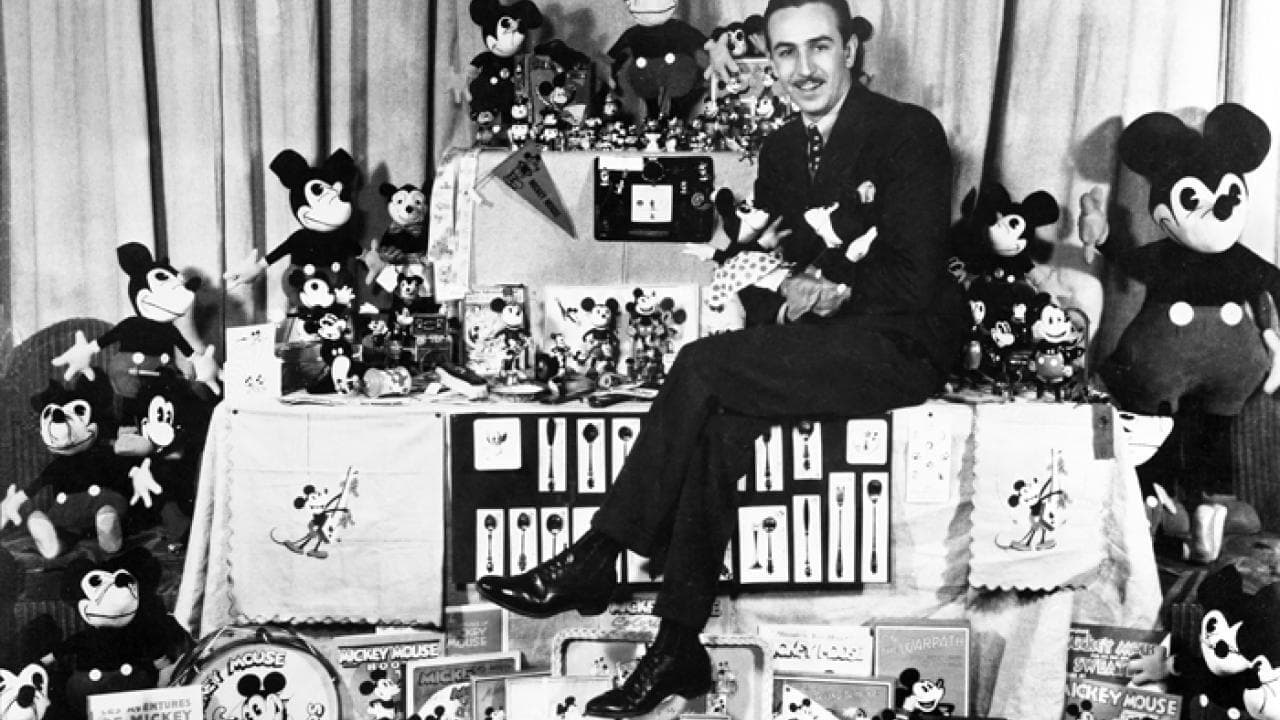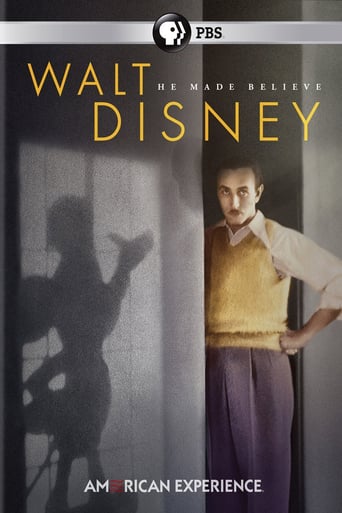

The Walt Disney American Experience PBS documentary is a good profile of a box of contradictions: a wholesome 'family' man and a rabid anti-communist conservative who was one of the heads of the Alliance that made things horrible for people in Hollywood for years (and what a speech he gives to his workers that made them organize *more* to strike in 1941); someone who claimed he wanted things simple and wasn't "literary" while creating one of the great abstract experimental films (Fantasia) and changing an artistic medium through his "fairy tales" and silly symphonies and Disneyland and so on.This is a very fair document of a man who created many of the films that made children around the world cry and laugh and (occasionally, as in part of the forest sequence in Snow White) pee themselves, while also being "hard-driving" while being inspirational for his workers (or those who stuck around).It's chock-a-block of great clips and somewhat obvious but nevertheless enlightening analyses of the "Big Five" first films (Snow White, Pinocchio, Dumbo, Bambi and Fantasia), and on to things from television like Walt Disneyland TV and the park itself. Here's a man who could do anything and for the better part of his later life got obsessed with trains and led on to making THE amusement park of the world (or as one interviewee calls it "a living animation"). From a portrait like this it's somewhat easy to call him difficult (he likely was), but it's rare to get someone in America who was a genuine entertainer - whether it connected with everyone, as he aimed for whether it was a Donald Duck cartoon or the blades of grass in the park, he had to make it just so - while being so, uh, 'wholesome' (depending on who you talk to of course).He's a wonderful bunch of contradictions, which is something we can relate to even as we're not all "visionaries" and such.
... View MoreThis biographical study of Disney certainly captured the man as a brilliant innovator and dedicated producer of wonderful things. But it was not honest in its treatment of the strikes that almost brought down his studio. It suggested that the strikes were merely the honest reactions to a company that callously underpaid its employees and wanted power over them and that Disney, along with other studio owners blamed their troubles on Communists ("imaginary antagonists"). The viewer is left with the belief that Communists didn't have the slightest influence in Hollywood, when in fact there is significant evidence from Soviet archives (released after the fall of the USSR) that many union leaders (including Herbert Sorrell, who led the strike against Disney) were Party members and that the strikes were financed by the Kremlin. Even if the show's producers didn't accept these claims, it was unconscionable not to even to mention the possibility.
... View MoreI am usually a huge fan of "The American Experience" and have watched dozens and dozens of their episodes. This is one of the first that I didn't particularly like--much of it because the film seemed less concerned with a chronological approach to Walt Disney's life. Instead, the film was looking for a darker side--a darker side that didn't always exist. Here are a couple examples:The strike at Disney in the early 40s WAS hard on the company and hard on Walt Disney. He was instrumental in trying to block unionization--that is true. But the film also seemed to say that he had an agenda to 'get back' at those responsible for the union--like Walt was a super-spiteful guy. Perhaps he was at times, but this didn't exactly jibe with biographies I read about the guy.The show concentrated A LOT on "Song of the South" and totally ignored a lot of other films that came out in the same time period. Between "Dumbo" and "Song of the South" were several Disney full- length films that didn't get mentioned and there were many films AFTER "Song of the South" that didn't get mentioned. "Song of the South" was mentioned because it offends many people's sensitivities today--and no other apparent reason. It wasn't one of the big classic hits made by the studio. Were they trying to say Walt was a bigot? Most evidence (such as his hiring practices at the company and treatment of non-white guests at Disneyland) would seem to indicate he wasn't. So why concentrate so hard on this one film?The bottom line is that instead of trying to tell Walt's life, the show was looking for a darker side and to promote a common theme to "American Experience" shows--race. To me, this isn't necessarily the most honest approach to a biography--more like a nod to political correctness as well as to create controversy.
... View MoreI was anxious to see a two-part program on the life of Walt Disney. This one shown on American Experience was a disappointment. Bits of his early life were tossed in as though you knew about them. Elias was presented as a one-dimensional authoritarian figure without much love for his sons. Both Walt and Roy have disabused us of this. There are so many hundreds of hours of interviews from people who knew Walt from the early days, and these were not chosen to be included. Instead, we got the "talking heads" approach from those who have read about Walt's life.Now, I was not expecting the Bob Thomas approach, but the first program wasted so much time with analyzing things that the facts of his life were jumbled and difficult to follow. Did Walt ever draw? When and why did he leave this and go to Laugh-O-grams? What was Elias 's attitude about this? Was Flora, his mother, supportive or critical? These things are knowable. Instead, we got more and more analysis. Then, Part One ended at a good dividing spot, but we were not prepared for the remainder of his life in the second program.It's true, as has written another writer, that one might tell the story of Walt's life in a five part Ken Burns style mini-series and get all the interesting and necessary facts included. Given a bit less than four hours, things must be omitted. We didn't see and hear any of the Nine Old Men, or Roy E or Roy O Disney, or Diane or Sharon, or Lillian. Lillian was responsible, pretty much by herself, for *Walt* Disney Concert Hall, and Roy was responsible for the name *Walt* Disney World and not Disney World. Why was Walt interested in creating EPCOT? Did he suddenly become preoccupied with future building? We heard that Hazel was with Walt at the end but we never heard from the person who spent more time with Walt than anyone else. Of course, many of the primary sources are long dead, but video of them exists, and some of it should have been included in order to tell Walt's life story, at the expense of the some of the commentary and analysis.
... View More